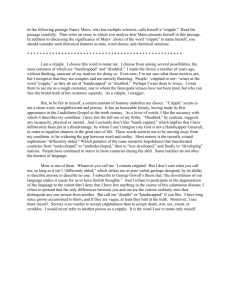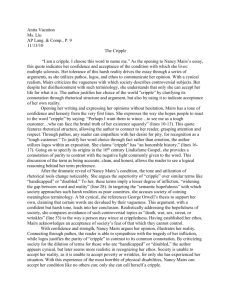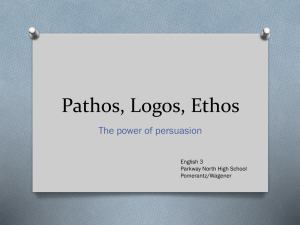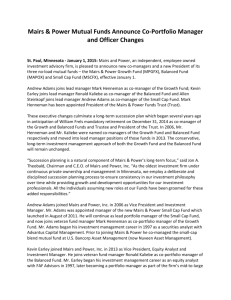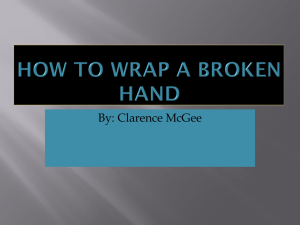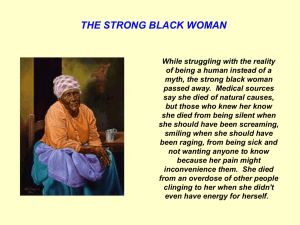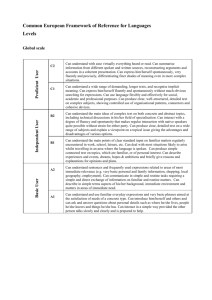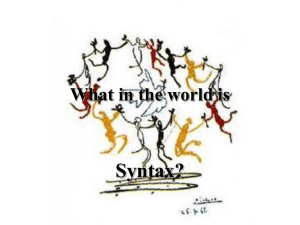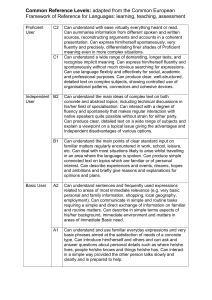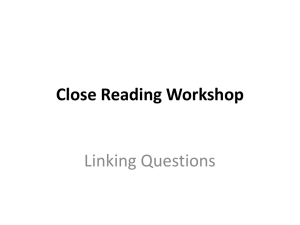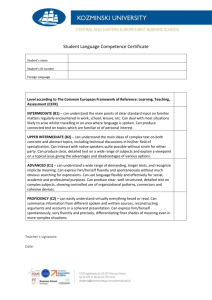In the following passage Nancy Mairs, who has multiple sclerosis
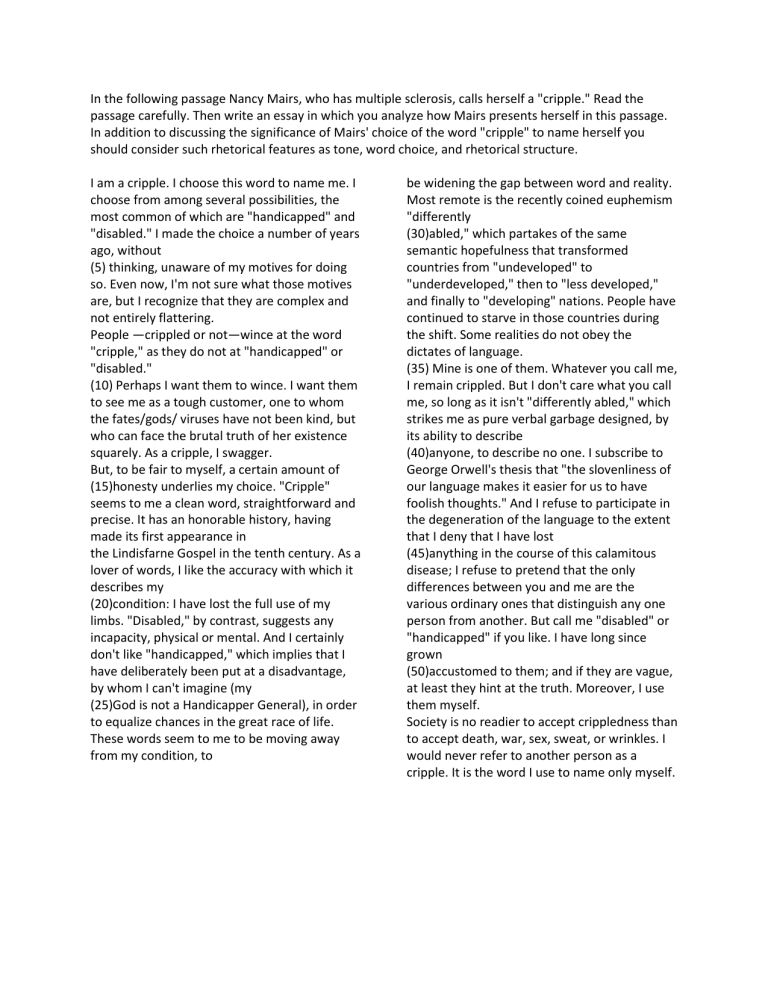
In the following passage Nancy Mairs, who has multiple sclerosis, calls herself a "cripple." Read the passage carefully. Then write an essay in which you analyze how Mairs presents herself in this passage.
In addition to discussing the significance of Mairs' choice of the word "cripple" to name herself you should consider such rhetorical features as tone, word choice, and rhetorical structure.
I am a cripple. I choose this word to name me. I choose from among several possibilities, the be widening the gap between word and reality.
Most remote is the recently coined euphemism most common of which are "handicapped" and
"disabled." I made the choice a number of years ago, without
"differently
(30)abled," which partakes of the same semantic hopefulness that transformed
(5) thinking, unaware of my motives for doing so. Even now, I'm not sure what those motives are, but I recognize that they are complex and not entirely flattering.
People —crippled or not—wince at the word
"cripple," as they do not at "handicapped" or
"disabled."
(10) Perhaps I want them to wince. I want them to see me as a tough customer, one to whom the fates/gods/ viruses have not been kind, but who can face the brutal truth of her existence squarely. As a cripple, I swagger.
But, to be fair to myself, a certain amount of
(15)honesty underlies my choice. "Cripple" countries from "undeveloped" to
"underdeveloped," then to "less developed," and finally to "developing" nations. People have continued to starve in those countries during the shift. Some realities do not obey the dictates of language.
(35) Mine is one of them. Whatever you call me,
I remain crippled. But I don't care what you call me, so long as it isn't "differently abled," which strikes me as pure verbal garbage designed, by its ability to describe
(40)anyone, to describe no one. I subscribe to
George Orwell's thesis that "the slovenliness of our language makes it easier for us to have seems to me a clean word, straightforward and precise. It has an honorable history, having made its first appearance in the Lindisfarne Gospel in the tenth century. As a lover of words, I like the accuracy with which it describes my
(20)condition: I have lost the full use of my limbs. "Disabled," by contrast, suggests any incapacity, physical or mental. And I certainly don't like "handicapped," which implies that I have deliberately been put at a disadvantage, by whom I can't imagine (my
(25)God is not a Handicapper General), in order to equalize chances in the great race of life.
These words seem to me to be moving away from my condition, to foolish thoughts." And I refuse to participate in the degeneration of the language to the extent that I deny that I have lost
(45)anything in the course of this calamitous disease; I refuse to pretend that the only differences between you and me are the various ordinary ones that distinguish any one person from another. But call me "disabled" or
"handicapped" if you like. I have long since grown
(50)accustomed to them; and if they are vague, at least they hint at the truth. Moreover, I use them myself.
Society is no readier to accept crippledness than to accept death, war, sex, sweat, or wrinkles. I would never refer to another person as a cripple. It is the word I use to name only myself.
SAMPLE 1: In this passage Mairs presents herself as a "cripple." She uses this word to symbolize her independence and strength, and through features such as word choice, tone, and structure, Mairs persuades the reader that her choice of the word "cripple" is the correct one for her.
In this passage, Mairs appears to be a person who knows who she is, what she can do, and what others think she is capable of accomplishing. With the succinct tone of the passage, Mairs implies that she is no-nonsense about her illness and will only reveal her true reasons for calling herself a cripple. She states that words such as handicapped, and disabled have other meanings that she does not wish to be associated with. In lines 11-13 she states clearly what she is. "One to whom the fates/gods/viruses have not been kind, but who can face the brutal truth of her existence squarely." Also by utilizing choice words and phrases such as "wince", "incapacity",
"disadvantage", she describes the situations of the handicapped and differently abled while she herself explicitly states that she knows the full meanings and consequences of what she says. Mairs states that by using other words than cripple she would be "...widening the gap between word and reality." However, Mairs' tone also seems to have a condescending manner to it. "Most remote is the ...euphemism "differently abled", which partakes of the same semantic hopefulness..." Through words such as "semantic" and "verbal garbage" (line 39)
Mairs seems to disdain those who do not perceive things the same way she does.
One can see that through the conciseness of the passage, the choice words and structure, Mairs presents herself to be a strong, independent woman who does not feel as much sorrow for herself as for those who call themselves, handicapped or differently abled.
SAMPLE 2: Ms. Mairs presents herself as strong, intelligent, and funny. She is also frank and even blunt, and she seems to challenge the reader, as well as challenging currently accepted beliefs and ideas. In calling herself "a cripple", she shows her desire to face facts and her firm grip on reality. What she does not say is as obvious as what she does: she is clearly a very courageous woman who has persevered over a difficult situation.
Mairs' frankness is obvious from the first line: "I am a cripple." Later she says, "I refuse to participate in the degeneration of the language to the extent that I deny that I have lost anything in the course of this calamitous disease." Additionally, she indicates a kind of contempt for those who pretend nothing is wrong with or different about anyone. The bluntness which characterizes the passage is evident in word choice, too, in that many words are sharp and hard-sounding, regardless of their meanings: "tough...brutal truth...straightforward...shift...dictates."
The ironic tone used by Mairs is blatant in lines such as, "As a cripple, I swagger." Obviously, since she cannot walk, she cannot swagger. Her metaphorical swaggering is, therefore, the brave front she puts forward. In her choice of the word 'swagger' it is possible that Mairs gave away more than she intended and confessed to vulnerability behind her bold comments. Whether or not it is intentional, Mairs has presented herself as multidimensional; although she seems extremely open, she is probably not telling the reader everything.
Mairs' intelligence is demonstrated in her use of impressive vocabulary and complex sentence structures:
"Most remote is the recently coined euphemism 'differently abled,' which partakes of the same semantic hopefulness..." Such a sentence could not have been written by a person who is not smart, and Mairs even admits to being a "lover of words."
Mairs shows a flair for sarcastic humor when she notes that "my God is not a Handicapper General." She is subtle but sharp, and she makes her points slyly. In the conclusion, she says that "society is no readier to accept crippledness than to accept death, war, sex, sweat, or wrinkles." An element of humor can be found in this comment in that although humans can in certain circumstances avoid some of these, no one can avoid "sweat" or
"death." Mairs pokes at the consciousness of Americans who have closed minds to what is real and true, as her disease is.
That Mairs uses the word cripple to describe herself is not surprising. After reading the passage, the reader is familiar with Mairs' refusal to hide from the truth. However, one wonders Whether Mairs truly doesn't
"care what you call me, so long as it isn't 'differently abled*." When she says that she "would never refer to another person as a cripple. It is the word I use to name only myself," Mairs admits that the word 'cripple' is an insult in most arenas. Another question is raised with this realization: does Mairs feel so negatively about herself that she willingly identifies herself by a name which is quite unflattering? Mairs is frank about most sides of her illness, but perhaps even she has not dealt with some elements of it.
